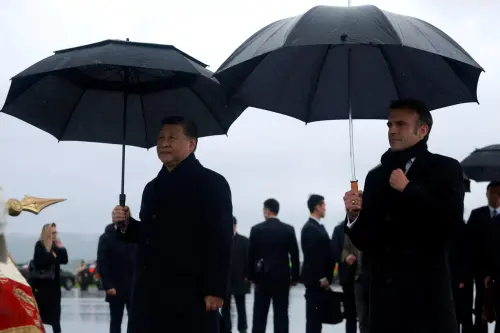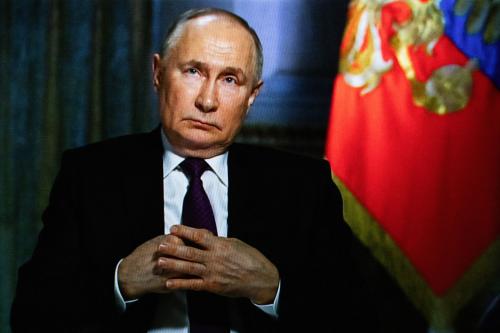Despite the conciliatory gestures to President Bush from European leaders following his reelection—and mutual promises of cooperation over the next four years—the frayed trans-Atlantic relationship is not likely to heal anytime soon, according to a panel of experts speaking at the Brookings Institution today.
The panel agreed that much of the disconnect between the United States and Europe, reflected in disagreements over the preemptive war in Iraq and U.S. withdrawal from several international treaties, stems from broader philosophical differences involving political legitimacy, global governance, and the appropriate use of military power. These divisions, the panelists said, are not likely to change any time soon.
John Hopkins professor Francis Fukuyama called the differences “deep and abiding” and spelled out some of the fundamental disparities that make gaps in the trans-Atlantic relationship difficult to bridge.
“Europeans like the welfare state and believe in social solidarity,” Fukuyama said. “Americans have mixed feelings about that. Europeans believe that they are transcending sovereignty, whereas Americans believe that legitimacy comes from democratic, sovereign states.” Attitudes toward religion are also different on the other side of the Atlantic, according to Fukuyama. “Europeans say that they like living in a continent where they don’t like the president getting up every morning and beginning each meeting with a prayer, and saying he’s inspired by God.”
Brookings Senior Fellow Ivo Daalder said that the United States believes in the transcendent effect of military and economic power, while Europe maintains that international institutions are best suited to address the world’s problems. Because of this and other differences, Daalder said, “the reality is that countries such as Germany and France might eventually say that they really can’t work with the United States in the way that we have in the past because we’re simply too different.”
While the United States and Europe cling to their take on their pronounced distinctions, both sides also harbor misconceptions about each other.
Council on Foreign Relations Senior Fellow Walter Russell Mead said that both the United States and Europe “are chasing false illusions that are leading them to behave in a certain way.”
The United States, according to Mead, believes that the rise of American power will usher in peace, prosperity, and democracy around the globe. Europe, on the other hand, maintains that it will exert a strong and positive influence on the world—despite the fact, Mead said, that “if there is one established trend around the world today, it is the steady decline of Europe and its influence throughout the 20th century.”
Europe, according to Mead, will have to undergo radical economic reform, increase military spending, bring Turkey into the European Union, increase its population, and improve the assimilation of immigrants.
“Until Europe addresses these five issues, a lot of Americans are going to think that the process of European unification is not so much the emergence of a new superpower, but rather the passengers on the Titanic huddling closer together as the ship sinks,” he said.
Fukuyama agreed that the European Union would be strengthened by adding Turkey to its ranks, but said that European traditions and cultures could ultimately prevent it from becoming strong and united.
“There is a huge domestic dimension to this that we Americans don’t have to deal with,” Fukuyama said. “And that is that Europeans have these crippling, collective action policies based on consensus” that oftentimes work against their best interest.
Despite the differences between the two, Hoover Institution Research Fellow Tod Lindberg said that the disagreements were unique and “bounded” since “it is not a disagreement that will ever result in armed conflict between the United States and Europe.” Lindberg, who edits the journal Policy Review, said that this phenomena allows the United States and Europe to disagree civilly and work together to improve dialogue.
Yet few on the panel were optimistic that relations between the United States and Europe would improve in the near future, especially with the reelection of Bush, a “conviction politician” who is widely unpopular in Europe.
“American foreign policy over the next four years is going to be exactly what John Kerry said it would be—more of the same,” Daalder said. “We won’t see a grand strategic, tactical, or rhetorical change. We are going to see exactly what we saw in the previous four years—an American policy run by a very confident president convinced of the power that the United States has and the purity of the motives that the United States has.”
In the long run, the panelists agreed, the relationship would achieve a satisfactory equilibrium.
“Europe will have to appreciate that the world is slightly different than the way it has looked at it up to this point,” Daalder said. “Europe will come to realize that if it wants to get anything done in the world, it will have to become a stronger, more united, power.”
“We’ll be forced to work out a relationship,” Mead said. “We’ll be unhappy with each other, but like a married couple that realizes they can’t afford to get divorced, we’ll be condemned to a close, but unhappy, relationship.”


Commentary
Op-edEvent Summary: What’s Next for the United States and Europe?
November 10, 2004